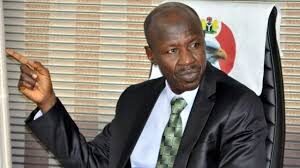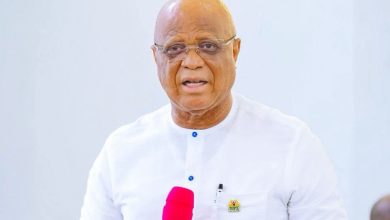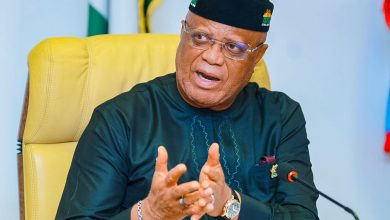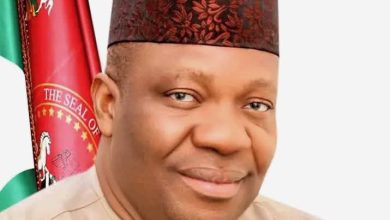
On Tuesday, July 7, 2020, Ibrahim Magu, the Acting Chairman of the Economic and Financial Crimes Commission, (EFCC), ended his assignment as the boss of the nation’s leading anti-graft agency. Magu’s exit was not totally unexpected. His tenure at EFCC, established in 2003, was dogged by a flurry of menacing fists wielded against him, rightly or wrongly from November 9, 2015 when he got the appointment.
Thus, for more than five years, he had remained ‘acting’ as every spirited effort made by the Presidency to have his appointment formally confirmed by the Senate failed woefully. His case then could be likened to an attempt to get a camel pass through the eye of a needle. And starkly, it remained an uphill task.
Magu then had to trudge on under the cloak of ‘acting’ until the Presidency finally gave up on him and literally ‘switched off’ the survival oxygen which ‘sustained’ him despite the repeated unsuccessful bid to get Senate’s clearance.
That he is now ‘suspended’ as the news broke out on Tuesday after facing a Presidential Panel – is simply a euphemism for being relieved or sacked. His fate now hangs in the balance. As a deputy commissioner of Police, is he returning to the Nigeria Police, his primary duty platform for reassignment or awaiting prosecution, going by the circumstance that greeted his exit?
Magu’s unceremonious exit has again brought to the front burner the monstrous case of corruption in Nigeria, which often prompts a saying that when you fight corruption, it fights back. As it is, corruption has been a turbulent and slippery turf to walk on. From Nuhu Ribadu, who served as the inaugural chairman to Chief (Mrs) Farida Mzamber Waziri, who succeeded him on June 6, 2008 and Ibrahim Lamorde, who came on board on November 23, 2011; the commission has been mired in controversies of compromise.
Underneath Magu’s travails were issues bordering on alleged “corruption over recovered loots, insubordination and abuse of office.” And these reportedly came from the Office of the Attorney-General and Minister of Justice, Abubakar Malami. Far back in December 2016, the Senate had also lifted the veil on its reluctance to clear Magu. The chairman, Senate Committee on Ethics, Privileges and Public Petitions, Senator Samuel Anyanwu, said its position was based on prevailing security report. According to him, the Senate “may review its decision on the acting chairman if he clears himself of the allegation contained in the security report on him.” Anyanwu, said, “The Presidency has the right to present him for screening again, if it is satisfied that the allegations against him in the report are baseless.
“The Senate will do its constitutional duty by adequately investigating petitions against any nominee so that a wrong person will not be appointed. Mr. Magu should clear himself of the allegations leveled against him otherwise the Senate will refuse to screen him if Mr. President should forward his name again,” he said.
Perhaps the height of that lingering ‘indictment’ and emerging fresh facts triggered his ‘arrest’ on the morning of Monday, July 6, 2020 by a police team outside his office in Abuja, as he was subsequently driven to the Presidential Villa, where he appeared before a panel investigating the allegations against him. It was the aftermath of his interrogation by the panel that his job ended. What a sad tale; a hunter becoming the hunted!
Righting the wrongs and fighting corruption was a major expectation that gave weight to the emergence of President Muhammadu Buhari in May 2015. Corruption had and still eats deep into the flesh of the nation as cancer. It has afflicted the country in virtually every fabric of our national life, dragging it to the morass of underdevelopment, poverty and insecurity.
Thus, as Muhammadu Buhari, Nigeria’s 4th democratic President declared his intention to confront corruption frontally; it was a message well received and celebrated not only by Nigerians but many foreign countries as well. The United States endorsed the anti-graft likewise the United Kingdom, which also pledged her support. Precisely, in October 2015, the United Kingdom pledged her support for the anti-corruption war by Buhari. Grant Shapps, the minister for international development, was quoted as saying that, “The UK is fully committed to helping Nigeria increase its security, stability and prosperity. We would continue to provide capacity building, technical and investigative support to Nigeria to tackle corruption. Corruption in Nigeria also affects the UK directly.”
Magu emerged as Buhari’s chief priest assigned to clean the Augean stable. To his credit, the commission recorded scores of high-profile corruption cases that have seen many politicians and businessmen convicted and sentenced to prison.
Of note, in May 2018, it announced that 603 Nigerians had been convicted on corruption charges since Buhari took office in 2015. It was not just the number; it also announced that for the first time in Nigeria’s history, judges and top military officers, including retired service chiefs, were prosecuted for corruption. But as good as the efforts were, with mounting commendations, holes were picked in the operations of the agency under Magu.
Leading evangelist William Kumuyi, the founder and general overseer of Deeper Life Bible Church, had at a time described Buhari’s anti-corruption war as a step in the right direction. But some others boldly railed at Magu that he engaged in selective prosecution, targeting members of the opposition party, the Peoples Democratic Party (PDP).
Debo Adeniran, the executive chairman of the Coalition Against Corrupt Leaders in a report titled “Heavy Knocks For Buhari’s Anti-Corruption” published by Sahara Reporters on October 31, 2015, claimed he had on several occasions petitioned the Presidency and anti-graft agencies; EFCC and the Independent Corrupt Practices Commission (ICPC) leveling corruption and misappropriation of fund charges against top shots in the ruling government, yet no action was ever taken. With a note of frustration, Adeniran stated, “We are dissatisfied with the way the anti-corruption war is being fought and we are afraid that we may not achieve anything better than what we had before Buhari assumed office.”
As reiterated by Bono, ‘The worst disease in the world today is corruption and there is a cure: transparency.’ Nigeria has to free itself from corruption. As reported by the Attorney General and Minister of Justice, our anti-graft agency recovered more than $2 trillion of stolen public funds in the last 12 years. Looting spree in the country can only be halted when anti-graft agencies remain totally uncompromising and give themselves to transparency.
That Ibrahim Magu has been booted out for apparently ‘compromising’ in his duties is a sad commentary. Having had four chairmen, with their exits clad in controversial circumstances, the Presidency must look deep into who gets the job as EFCC boss. It is laughable when the hunter becomes the hunted. Let’s rise to end the saga of corruption fighting back victoriously.





